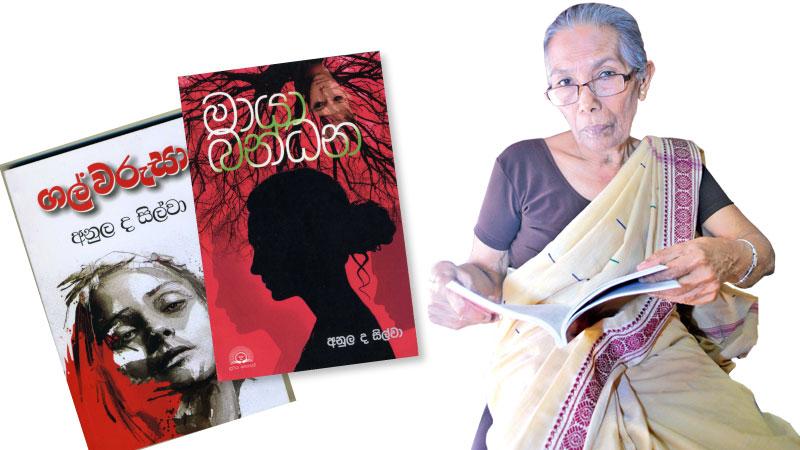
Journalist and novelist Anula de Silva talks about her three latest novels, and what inspires her to continue to write and publish.
Over the last five decades, Journalist and novelist Anula de Silva has earned a reputation for writing books full of optimism, awe-inspiring narratives set on local traditions, family values and incidents that would perhaps disappear from our society after her generation. As a celebrated Sinhala writer, Anula is the author of over 120 works that include novels, short stories and translations.
We caught up with Anula recently, when she came to Lake House, an institution where she had spent most of her professional life, to introduce her latest novels-Maya Bandana, Gal Warusa and Kandula saha Sinahawa.
Three novels
In these three books she explores vivid and personal themes, like the power of women and the search for home, the pull of family and her Southern roots, and the perils and joys of life.
A native of Ambalangoda, Anula completed her higher studies at the University of Peradeniya. “The two settings influenced me to become a writer,” says Anula whose family is quite proud about their deep rooted Southern traditions and values.
She adds, “When I came to Peradeniya, I found the place passionate about literature and the arts. There were legends such as Prof. Ediriweera Sarachchandra. What was unique about the professor was that, in his presence, everyone is encouraged to become an artist or a writer. A majority of students, who came to Peradeniya around that time, ended up becoming at least someone who would appreciate art and literature.”
Anula was no exception. She too made Peradeniya the launching pad for becoming a writer. “I had a vivid imagination, and enjoyed telling stories. So in Peradeniya, I already had a draft of a novel. One of the lecturers who read it thought it was not good enough to publish,” she recalls. But when Prof. Sarachchandra read her draft, he wanted her to publish it. Encouraged by Prof Sarachchandra’s words, Anula published her first novel ‘Unmaththakayo’. That was in 1964. Unmaththakayo was also published in the Silumina, as a weekly novel.
English media
During the same time she got the opportunity to join Lake House as a young writer; whereby she became a full time writer, journalist and an editor.
“I used to write a lot of short stories in Sinhala, which were often published in Lake House publications. A fellow journalist who worked in the English media - Vijitha Fernando - was very interested in my writings and got them translated into English and published them in the Daily News,”she recalled.
This gave her the opportunity to expand her readership. “Those who read the Daily News also became my fans. I am thankful to Vijitha for introducing me to a different segment of readers,” Anula says.
For Anula, writing happens quite naturally. And with her experience so far she can now write faster and finish a book in about four months. But it doesn’t mean she writes a book every four months.
“I publish a book every year. However, this time I managed to print three books together. My books talk a lot about women and their issues and how women should cultivate positive attributes and values to face their problems with courage. I believe women have an inbuilt strength to go through any issues in life. And I want other women also to find out their own strengths; so my books are a mirror of my heart,” she adds.
“Personally, I have seen many a woman writer end their writing career when they start a family. Most women professionals find it difficult to continue their careers after marriage because the support system is diminishing in our society. For women who write, it becomes more difficult to maintain the balance between work and family as writing usually takes a lot of time.” However, for Anula, marriage was a blessing and she continued to do well in her writing career. When she lost her husband 13 years ago, she found solace in writing.
“I overcame my loneliness by getting more and more engaged in writing, during that difficult time,” Anula explains. In her journalism career Anula became the first editor of Sirikatha, a women’s weekly. Thereafter, she worked for several other women’s weeklies.
Her job at the National Youth Services Council gave her the opportunity to contribute to youth development activities in the country.
Technology challenge
Although Anula has not received any national awards for her popular novels, she has received accolades from the Editors’ Guild for her contributions to journalism, the Abhimani Development Foundation for her contributions to literature, and a state award for the youth novel, Nanda and Sarana written by her.
Talking about the challenges faced by today’s writers with the development of technology-based reading material, Anula says, “Good books anyway attract readers. We, the writers, need to be aware of such challenges and continue to write books that can contribute to the world of literature.” On the other hand, she says, parents should encourage their children to read books, as much as possible. “Parents should read books along with their kids.
This encourages the kids to read more books physically.
This practice will also help inspire families to stay together. Technology-based reading often lead to the separation of family members, as individuals become glued to their computers or tablets, and be on their own. In schools, young writers should be encouraged to publish their work.”
Anula herself is a regular reader. Among her favourite writers are Martin Wickremesinghe, Jayasena Jayakody and Pearl S. Buck. - CJ
